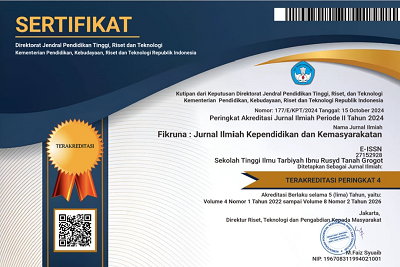DIALOG MORAL UNIVERSAL HARMONISASI PEMIKIRAN HABERMAS, AL-FARABI, DAN KONFUSIUS DALAM ETIKA KOMUNIKASI LINTAS BUDAYA
Abstract
This research aims to develop the concept of universal moral dialogue by harmonizing the thoughts of three important figures: Jgen Habermas, Al-Farabi, and Confucius in the context of the ethics of intercultural communication. Habermas put forward a theory of communicative action that emphasizes rationality and intersubjective agreement. Meanwhile, Al-Farabi highlighted the importance of virtue and collective purpose in creating an ideal society, and Confucius emphasized the principles of harmony, hierarchical relationships, and the values of politeness. Through qualitative analysis with a literature study approach, this study finds similarities between the three thoughts, namely the importance of a dialogue based on morality that integrates rationality, virtue, and harmony. The proposed model of intercultural communication consists of five main pillars: equality in dialogue, respect for diversity, the search for common truth, the application of virtue, and the achievement of collective harmony. This model is particularly relevant in facing the increasingly urgent challenges of globalization for ethical and inclusive intercultural interactions.
References
Alya Rahmayani Siregar, Azrai Harahap, and Mahardhika Sastra Nasution, �Etika Komunikasi Media Digital Di Era Post-Truth�, Jurnal Paradigma: Jurnal Multidisipliner Mahasiswa Pascasarjana Indonesia, 5.1 (2024), 39�53.
J�rgen Habermas, The Theory of Communicative Action (Wiley: Polity Press, 2015).
Abu Nasr Al-Farabi, �On The Perfect State, Al-Farabi�, 1985.
Muhammad Rauf, Mushtaq Ahmad, and Zafar Iqbal, �Al-Farabi � S Philosophy of Education�, Educational Research International, 1.2 (2013), 85�94.
Zhang Longxi and others, East Asian Comparative Literature and Culture (Boston: BRILL, 2014).
Creswell John and Creswell David, Research Design, Qualitative, Quantitative and Mixed Methods Approaches, SAGE Publications,Inc. (Los Angeles: Sage Publications, 2023), Sixth Edit.
Max Weber, The Protestant Ethic and the Spirit of Capitalism, The Routledge International Handbook on Max Weber (London and New York: Routledge, 2022)
JOHN RAWLS, A THEORY OF JUSTICE (Cambridge: HARVARD UNIVERSITY PRESS, 2015).
W. Littlejohn, Stephen, Karen A.Foss, and John G. Oetzel, THEORIES OF HUMAN COMMUNICATION Eleventh Edition, Waveland Press, Inc., 2017, liii.
Bent Flyvbjerg, Making Social Science Matter (New York: Cambridge University Press, 2015).
Thomas McCarthy, �The Critical Theory of Jurgen Habermas� (Cambridge: The MIT Press, 1981).
Sherry Turkle, Alone Together: Why We Expect More From Technology and Less From Each Other, Journal of Interdisciplinary Studies (New York: Basic Book, 2011), xxxiii
Christoph Horn and Dieter Sch�necker, Groundwork for the Metaphysics of Morals, Groundwork for the Metaphysics of Morals, 2008
Michel Foucault, DISCIPLINE AND PUNISH The Birth of the Prison (NEW YORK: VINTAGE BOOKS, 2015).
Jennifer Rowley, �The Wisdom Hierarchy: Representations of the DIKW Hierarchy�, Journal of Information Science, 33.2 (2007), 163�80
Niklas Luhmann, SOCIAL SYSTEMS, Journal GEEJ (CALIFORNIA: STANFORD UNIVERSITY PRESS, 1995), vii.
Clifford G Christians and others, Media Ethics; Cases and Moral Reasoning; Eleventh Edition (New York: Routledge Taylor & Francis Group, 2020).
Sabih Ahmad Kamali, �Tahafut Al-Falasifah�, New Scholasticism (Lahore: Pakistan Philosophical Congress, 1963), 247�49
Chenyang Li, The Confucian Philosophy of Harmony, The Confucian Philosophy of Harmony (Routledge, 2013)
Tu Wei-ming, Confucian Thought: Selfhood as Creative Transformation (New York: State University of New York Press, 1985).
Philip J. Ivanhoe, �Confucian Moral Self Cultivation� (CALIFORNIA: Hackett Publishing Campany, Inc, 2000).
WING-TSIT CHAN, A SOURCE BOOK IN CHINESE PHILOSOPHY, Sustainability (Switzerland) (New Jersey: Princeton University Press, 1963), xi.
Craig Ireland, Self-Identity, Late Modernity, and the Politics of Immediacy (London: McGill-Queen�s University Press, 2004).
Anthony Giddens, Modernity and Self-Identity, Proceedings of the International Conference on Offshore Mechanics and Arctic Engineering - OMAE (UK: Polity Press, 1991), iii.
Tu Wei-ming, Confucian Thought: Selfhood as Creative Transformation (New York: State University of New York Press, 1985);
John M Nicholas and others, �Of Critical Philosophy�; Y. Yu and J. Wardenier, Parameter Study on the Static Strength of Axially Loaded Multiplanar XX-Joints in Rectangular Hollow Sections, Proceedings of the International Conference on Offshore Mechanics and Arctic Engineering - OMAE, 1996, iii.
Copyright (c) 2025 Bustami Bustami, Iskandar Zulkarnain, Mailin Mailin

This work is licensed under a Creative Commons Attribution-NonCommercial 4.0 International License.



.png)












